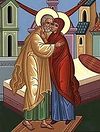

| Previous day | Next day |
| Old Style
July 25
|
Monday |
New Style
August 7
|
| 10th Week after Pentecost. Tone 8. | No fast.
|
![]() The Dormition of the Righteous Anna, Mother of the Most Holy Theotokos.
The Dormition of the Righteous Anna, Mother of the Most Holy Theotokos. ![]() Sts. Olympias (Olympiada) the Deaconess, of Constantinople (409),
Sts. Olympias (Olympiada) the Deaconess, of Constantinople (409), ![]() and the Virgin Eupraxia of Tabennisi (413).
and the Virgin Eupraxia of Tabennisi (413). ![]() St. Macarius of Zheltovod and Unzha, monastic founder (1444).
St. Macarius of Zheltovod and Unzha, monastic founder (1444).
Commemoration of the Holy 165 Fathers of the Fifth Ecumenical Council (553). St. Christopher, abbot of Solvychegodsk (Vologda) (1572).
New Hieromartyr Alexander Sakharov, archpriest, of St. Petersburg (1927). New Hieromartyr Theodore Tonkovid, priest, of Lovets (Pskov) (1942).
St. Gregory (Kallidis), metropolitan of Thessalonica and Heraclea (1925). New Hieromartyrs Vukosav Milanovic and Rodoljub Samardzic, of Kulen Vakuf, Serbia (1941-1945).
Thoughts for Each Day of the Year
According to the Daily Church Readings from the Word of God
By St. Theophan the Recluse

Monday. [I Cor. 15:12-19; Matt. 21:18-22]
The Lord condemned the fig tree to fruitlessness because in appearance it was so covered with leaves that there ought to have been fruit on it; however, none could be found. In applying this to the Christian life, the leaves represent outward works of piety and outward spiritual feats, while the fruits represent inner dispositions. This is a law: the former should proceed from the latter. But out of condescension for our infirmity, the latter should in any case develop together with the former. When the former are strong but the latter are not even budding, a lie of life results, which expresses itself like this: to seem, but not to be. At first this unfortunate state is perhaps not in one’s thoughts, but then it appears unnoticeably and establishes itself as a way of life. When one applies himself excessively to externals and becomes passionately attached to them, his attention toward his heart is suppressed, his spiritual feelings die away, and coldness settles in. At this stage spiritual life freezes, and there remains only an appearance of piety, but no piety. The behaviour is proper on the outside, but inwardly to the contrary. The consequence of this is spiritual fruitlessness–deeds are done, but they are all dead.
Articles
 Holy, Righteous Ancestor of God, AnnaSaint Anna was the daughter of Matthan the priest, who was of the tribe of Levi. St Anna’s family came from Bethlehem. |
 Virginmartyr Eupraxia of TabennaSaint Eupraxia was daughter of the Constantinople dignitary Antigonos, a kinsman of the holy Emperor Theodosius the Great (379-395). |
 Venerable Macarius the Abbot of Zheltovod and UnzhaAt twelve years of age he secretly left his parents and accepted monastic tonsure at the Nizhni-Novgorod Caves monastery under Saint Dionysius. |






